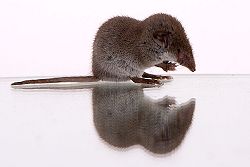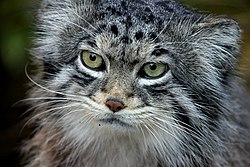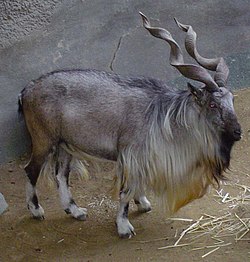List of mammals of Uzbekistan
This is a list of the mammal species recorded in Uzbekistan. There are 98 mammal species in Uzbekistan, of which one is critically endangered, three are endangered, six are vulnerable, and four are near threatened.
The following tags are used to highlight each species' conservation status as assessed by the International Union for Conservation of Nature:
| EX | Extinct | No reasonable doubt that the last individual has died. |
| EW | Extinct in the wild | Known only to survive in captivity or as a naturalized populations well outside its previous range. |
| CR | Critically endangered | The species is in imminent risk of extinction in the wild. |
| EN | Endangered | The species is facing an extremely high risk of extinction in the wild. |
| VU | Vulnerable | The species is facing a high risk of extinction in the wild. |
| NT | Near threatened | The species does not meet any of the criteria that would categorise it as risking extinction but it is likely to do so in the future. |
| LC | Least concern | There are no current identifiable risks to the species. |
| DD | Data deficient | There is inadequate information to make an assessment of the risks to this species. |
Rodents make up the largest order of mammals, with over 40% of mammalian species. They have two incisors in the upper and lower jaw which grow continually and must be kept short by gnawing. Most rodents are small though the capybara can weigh up to 45 kg (99 lb).
- Suborder: Sciurognathi
- Family: Sciuridae (squirrels)
- Subfamily: Xerinae
- Tribe: Xerini
- Genus: Spermophilopsis
- Long-clawed ground squirrel, S. leptodactylus LC
- Genus: Spermophilopsis
- Tribe: Marmotini
- Genus: Marmota
- Long-tailed marmot, M. caudata LC
- Menzbier's marmot, M. menzbieri VU
- Genus: Spermophilus
- Yellow ground squirrel, Spermophilus fulvus
- Little ground squirrel, Spermophilus pygmaeus
- Genus: Marmota
- Tribe: Xerini
- Subfamily: Xerinae
- Family: Gliridae (dormice)
- Subfamily: Leithiinae
- Genus: Dryomys
- Forest dormouse, Dryomys nitedula
- Genus: Dryomys
- Subfamily: Leithiinae
- Family: Dipodidae (jerboas)
- Subfamily: Allactaginae
- Genus: Allactaga
- Great jerboa, Allactaga major
- Severtzov's jerboa, Allactaga severtzovi
- Vinogradov's jerboa, Allactaga vinogradovi
- Genus: Allactodipus
- Bobrinski's jerboa, Allactodipus bobrinskii
- Genus: Allactaga
- Subfamily: Cardiocraniinae
- Genus: Salpingotus
- Heptner's pygmy jerboa, Salpingotus heptneri
- Genus: Salpingotus
- Subfamily: Dipodinae
- Genus: Dipus
- Northern three-toed jerboa, Dipus sagitta
- Genus: Eremodipus
- Lichtenstein's jerboa, Eremodipus lichtensteini
- Genus: Jaculus
- Turkmen jerboa, Jaculus turcmenicus
- Genus: Paradipus
- Comb-toed jerboa, Paradipus ctenodactylus
- Genus: Stylodipus
- Thick-tailed three-toed jerboa, Stylodipus telum
- Genus: Dipus
- Subfamily: Allactaginae
- Family: Cricetidae
- Subfamily: Arvicolinae
- Genus: Blanfordimys
- Afghan vole, Blanfordimys afghanus
- Genus: Ellobius
- Zaisan mole vole, Ellobius tancrei
- Genus: Blanfordimys
- Subfamily: Arvicolinae
- Family: Muridae (mice, rats, voles, gerbils, hamsters)
- Subfamily: Gerbillinae
- Genus: Meriones
- Libyan jird, Meriones libycus LC
- Midday jird, Meriones meridianus
- Tamarisk jird, Meriones tamariscinus
- Genus: Meriones
- Subfamily: Murinae
- Genus: Nesokia
- Short-tailed bandicoot rat, Nesokia indica LC
- Genus: Nesokia
- Subfamily: Gerbillinae
- Family: Sciuridae (squirrels)
Order: Lagomorpha (lagomorphs)
[edit]The lagomorphs comprise two families, Leporidae with hares and rabbits, and Ochotonidae with pikas. Though they can resemble rodents, and were classified as a superfamily in that order until the early 20th century, they have since been considered a separate order.
- Family: Leporidae
- Genus: Lepus
- Tolai hare, L. tolai LC[1]
- Genus: Lepus
- Family: Ochotonidae
- Genus: Ochotona
- Turkestan red pika, O. rutila LC
- Genus: Ochotona
Order: Erinaceomorpha (hedgehogs and gymnures)
[edit]
The order Erinaceomorpha contains a single family, Erinaceidae, which comprise the hedgehogs and gymnures. The hedgehogs are easily recognised by their spines while gymnures look more like large rats.
- Family: Erinaceidae (hedgehogs)
- Subfamily: Erinaceinae
- Genus: Hemiechinus
- Long-eared hedgehog, H. auritus LC
- Genus: Paraechinus
- Brandt's hedgehog, P. hypomelas LC
- Genus: Hemiechinus
- Subfamily: Erinaceinae
Order: Soricomorpha (shrews, moles, and solenodons)
[edit]
The "shrew-forms" are insectivorous mammals. The shrews and solenodons closely resemble mice while the moles are stout-bodied burrowers.
- Family: Soricidae (shrews)
- Subfamily: Crocidurinae
- Genus: Crocidura
- Gueldenstaedt's shrew, C. gueldenstaedtii LC
- Lesser white-toothed shrew, C. suaveolens LC[2]
- Genus: Diplomesodon
- Piebald shrew, D. pulchellum LC
- Genus: Crocidura
- Subfamily: Soricinae
- Tribe: Soricini
- Genus: Sorex
- Eurasian pygmy shrew, S. minutus LC
- Genus: Sorex
- Tribe: Soricini
- Subfamily: Crocidurinae
Order: Chiroptera (bats)
[edit]
The bats' most distinguishing feature is that their forelimbs are developed as wings, making them the only mammals capable of flight. Bat species account for about 20% of all mammals.
- Family: Vespertilionidae
- Subfamily: Myotinae
- Genus: Myotis
- Long-fingered bat, M. capaccinii VU[3]
- Geoffroy's bat, M. emarginatus LC[4]
- Fraternal myotis, M. frater LC
- Bokhara whiskered bat, M. bucharensis DD
- Genus: Myotis
- Subfamily: Vespertilioninae
- Genus: Eptesicus
- Bobrinski's serotine, E. bobrinskoi LC
- Botta's serotine, E. bottae LC
- Serotine, E. serotinus LC
- Genus: Nyctalus
- Greater noctule bat, N. lasiopterus NT[5]
- Lesser noctule, N. leisleri LC[6]
- Genus: Eptesicus
- Subfamily: Myotinae
- Family: Rhinolophidae
- Subfamily: Rhinolophinae
- Genus: Rhinolophus
- Bokhara horseshoe bat, R. bocharicus LC
- Greater horseshoe bat, R. ferrumequinum LC[7]
- Lesser horseshoe bat, R. hipposideros LC[8]
- Genus: Rhinolophus
- Subfamily: Rhinolophinae



There are over 260 species of carnivorans, the majority of which feed primarily on meat. They have a characteristic skull shape and dentition.
- Suborder: Feliformia
- Family: Felidae (cats)
- Subfamily: Felinae
- Genus: Caracal
- Genus: Felis
- Jungle cat, F. chaus LC[10]
- African wildcat, F. lybica LC[11]
- Asiatic wildcat, F. l. ornata
- Sand cat, F. margarita LC[12]
- Genus: Lynx
- Eurasian lynx, L. lynx LC[13]
- Genus: Otocolobus
- Pallas's cat, O. manul LC[14]
- Subfamily: Pantherinae
- Genus: Panthera
- Snow leopard, P. uncia VU[15]
- Genus: Panthera
- Subfamily: Felinae
- Family: Hyaenidae (hyaenas)
- Genus: Hyaena
- Striped hyena, H. hyaena NT[16]
- Genus: Hyaena
- Family: Felidae (cats)
- Suborder: Caniformia
- Family: Canidae (dogs, foxes)
- Genus: Canis
- Golden jackal, C. aureus LC[17]
- Gray wolf, C. lupus LC[18]
- Genus: Vulpes
- Corsac fox, V. corsac LC[19]
- Red fox, V. vulpes LC[20]
- Genus: Canis
- Family: Ursidae (bears)
- Genus: Ursus
- Brown bear, U. arctos LC[21]
- Genus: Ursus
- Family: Mustelidae (mustelids)
- Genus: Lutra
- Eurasian otter, L. lutra NT[22]
- Genus: Meles
- Asian badger, M. leucurus LC[23]
- Genus: Mustela
- Stoat, M. erminea LC[24]
- Steppe polecat, M. eversmannii LC[25]
- Least weasel, M. nivalis LC[26]
- Genus: Vormela
- Marbled polecat, V. peregusna VU[27]
- Genus: Lutra
- Family: Canidae (dogs, foxes)
Order: Perissodactyla (odd-toed ungulates)
[edit]The odd-toed ungulates are browsing and grazing mammals. They are usually large to very large, and have relatively simple stomachs and a large middle toe.
- Family: Equidae (horses etc.)
- Genus: Equus
- Onager, E. hemionus NT[28]
- Turkmenian kulan, E. h. kulan EN
- Onager, E. hemionus NT[28]
- Genus: Equus
Order: Artiodactyla (even-toed ungulates)
[edit]
The even-toed ungulates are ungulates whose weight is borne about equally by the third and fourth toes, rather than mostly or entirely by the third as in perissodactyls. There are about 220 artiodactyl species, including many that are of great economic importance to humans.
- Family: Cervidae (deer)
- Subfamily: Cervinae
- Genus: Cervus
- Central Asian red deer C. hanglu LC[29]
- Bactrian deer, C. h. bactrianus[29]
- Central Asian red deer C. hanglu LC[29]
- Genus: Cervus
- Subfamily: Cervinae
- Family: Bovidae (cattle, antelope, sheep, goats)
- Subfamily: Antilopinae
- Genus: Gazella
- Goitered gazelle, G. subgutturosa VU[30]
- Genus: Saiga
- Saiga antelope, S. tatarica CR[31]
- Genus: Gazella
- Subfamily: Caprinae
- Subfamily: Antilopinae
Locally extinct
[edit]The following species are locally extinct in Uzbekistan:
- Cheetah, Acinonyx jubatus[36]
- Dhole, Cuon alpinus[37]
- Leopard, Panthera pardus[38]
- Tiger, Panthera tigris[39]
See also
[edit]References
[edit]- ^ Smith, A.T.; Johnston, C.H. (2019). "Lepus tolai". IUCN Red List of Threatened Species. 2019: e.T41308A45193447.
- ^ Hutterer, R.; Amori, G.; Krystufek, B.; Yigit, N.; Mitsain, G. & Palomo, L.J. (2010). "Crocidura suaveolens". IUCN Red List of Threatened Species. 2010: e.T29656A9511068.
- ^ Hutson, A. M.; Spitzenberger, F.; Aulagnier, S.; Juste, J.; Karatas, A.; Palmeirim, J. & Paunovic, M. (2010). "Myotis capaccinii". IUCN Red List of Threatened Species. 2010: e.T14126A4399043.
- ^ Piraccini, R. (2016). "Myotis emarginatus". IUCN Red List of Threatened Species. 2016: e.T14129A22051191.
- ^ Hutson, A. M.; Alcaldé, J. T.; Juste, J.; Karataş, A.; Palmeirim, J. & Paunović, M. (2010). "Nyctalus lasiopterus". IUCN Red List of Threatened Species. 2010: e.T14918A4471682.
- ^ Juste, J. & Paunović, M. (2016). "Nyctalus leisleri". IUCN Red List of Threatened Species. 2016: e.T14919A22016159.
- ^ Piraccini, R. (2016). "Rhinolophus ferrumequinum". IUCN Red List of Threatened Species. 2016: e.T19517A21973253.
- ^ Taylor, P. (2016). "Rhinolophus hipposideros". IUCN Red List of Threatened Species. 2016: e.T19518A21972794.
- ^ Avgan, B.; Henschel, P. & Ghoddousi, A. (2016). "Caracal caracal". IUCN Red List of Threatened Species. 2016: e.T3847A102424310.
- ^ Gray, T.N.E.; Timmins, R.J.; Jathana, D.; Duckworth, J.W.; Baral, H. & Mukherjee, S. (2016). "Felis chaus". IUCN Red List of Threatened Species. 2016: e.T8540A50651463.
- ^ Ghoddousi, A.; Belbachir, F.; Durant, S.M.; Herbst, M. & Rosen, T. (2022). "Felis lybica". IUCN Red List of Threatened Species. 2022: e.T131299383A154907281. doi:10.2305/IUCN.UK.2022-1.RLTS.T131299383A154907281.en.
- ^ Sliwa, A.; Ghadirian, T.; Appel, A.; Banfield, L.; Sher Shah, M. & Wacher, T. (2016). "Felis margarita". IUCN Red List of Threatened Species. 2016: e.T8541A50651884.
- ^ Breitenmoser, U.; Breitenmoser-Würsten, C.; Lanz, T.; von Arx, M.; Antonevich, A.; Bao, W. & Avgan, B. (2015). "Lynx lynx". IUCN Red List of Threatened Species. 2015: e.T12519A121707666.
- ^ Ross, S.; Barashkova, A.; Dhendup, T.; Munkhtsog, B.; Smelansky, I.; Barclay, D. & Moqanaki, E. (2020). "Otocolobus manul". IUCN Red List of Threatened Species. 2020: e.T15640A162537635.
- ^ McCarthy, T.; Mallon, D.; Jackson, R.; Zahler, P. & McCarthy, K. (2017). "Panthera uncia". IUCN Red List of Threatened Species. 2017: e.T22732A50664030.
- ^ AbiSaid, M. & Dloniak, S.M.D. (2015). "Hyaena hyaena". IUCN Red List of Threatened Species. 2015: e.T10274A45195080.
- ^ Hoffmann, M.; Arnold, J.; Duckworth, J. W.; Jhala, Y.; Kamler, J. F. & Krofel, M. (2018). "Canis aureus". IUCN Red List of Threatened Species. 2018: e.T118264161A46194820.
- ^ Boitani, L.; Phillips, M. & Jhala, Y. (2018). "Canis lupus". IUCN Red List of Threatened Species. 2018: e.T3746A119623865.
- ^ Murdoch, J.D. (2014). "Vulpes corsac". IUCN Red List of Threatened Species. 2014: e.T23051A59049446.
- ^ Hoffmann, M. & Sillero-Zubiri, C. (2016). "Vulpes vulpes". IUCN Red List of Threatened Species. 2016: e.T23062A46190249.
- ^ McLellan, B. N.; Proctor, M. F.; Huber, D. & Michel, S. (2017). "Ursus arctos". IUCN Red List of Threatened Species. 2017: e.T41688A121229971.
- ^ Roos, A.; Loy, A.; de Silva, P.; Hajkova, P. & Zemanová, B. (2015). "Lutra lutra". IUCN Red List of Threatened Species. 2015: e.T12419A21935287.
- ^ Abramov, A. (2016). "Meles leucurus". IUCN Red List of Threatened Species. 2016: e.T136385A45221149.
- ^ Reid, F.; Helgen, K. & Kranz, A. (2016). "Mustela erminea". IUCN Red List of Threatened Species. 2016: e.T29674A45203335.
- ^ Maran, T.; Skumatov, D.; Abramov A. V. & Kranz, A. (2016). "Mustela eversmanii". IUCN Red List of Threatened Species. 2016: e.T29679A45203762.
- ^ McDonald, R. A.; Abramov, A. V.; Stubbe, M.; Herrero, J.; Maran, T.; Tikhonov, A.; Cavallini, P.; Kranz, A.; Giannatos, G.; Kryštufek, B. & Reid, F. (2019). "Mustela nivalis". IUCN Red List of Threatened Species. 2019: e.T70207409A147993366.
- ^ Abramov, A.V.; Kranz, A. & Maran, T. (2016). "Vormela peregusna". IUCN Red List of Threatened Species. 2016: e.T29680A45203971.
- ^ Kaczensky, P.; Lkhagvasuren, B.; Pereladova, O.; Hemami, M. & Bouskila, A. (2020). "Equus hemionus". IUCN Red List of Threatened Species. 2020: e.T7951A166520460.
- ^ a b Brook, S.M.; Donnithorne-Tait, D.; Lorenzini, R.; Lovari, S.; Masseti, M.; Pereladova, O.; Ahmad, K. & Thakur, M. (2017). "Cervus hanglu". IUCN Red List of Threatened Species. 2017: e.T4261A120733024.
- ^ IUCN SSC Antelope Specialist Group (2017). "Gazella subgutturosa". IUCN Red List of Threatened Species. 2017: e.T8976A50187422.
- ^ IUCN SSC Antelope Specialist Group (2018). "Saiga tatarica". IUCN Red List of Threatened Species. 2018: e.T19832A50194357.
- ^ Michel, S. & Rosen Michel, T. (2015). "Capra falconeri". IUCN Red List of Threatened Species. 2015: e.T3787A97218336.
- ^ Reading, R.; Michel, S.; Suryawanshi, K.; Bhatnagar, Y.V. (2020). "Capra sibirica". IUCN Red List of Threatened Species. 2020: e.T42398A22148720. Retrieved 10 July 2020.
- ^ Reading, R.; Michel, S. & Amgalanbaatar, S. (2020). "Ovis ammon". IUCN Red List of Threatened Species. 2020: e.T15733A22146397.
- ^ Michel, S. & Ghoddousi, A. (2020). "Ovis vignei". IUCN Red List of Threatened Species. 2020: e.T54940655A54940728.
- ^ Durant, S.; Mitchell, N.; Ipavec, A. & Groom, R. (2015). "Acinonyx jubatus". IUCN Red List of Threatened Species. 2015: e.T219A50649567.
- ^ Kamler, J. F.; Songsasen, N.; Jenks, K.; Srivathsa, A.; Sheng, L. & Kunkel, K. (2015). "Cuon alpinus". IUCN Red List of Threatened Species. 2015: e.T5953A72477893.
- ^ Stein, A.B.; Athreya, V.; Gerngross, P.; Balme, G.; Henschel, P.; Karanth, U.; Miquelle, D.; Rostro-Garcia, S.; Kamler, J. F.; Laguardia, A.; Khorozyan, I. & Ghoddousi, A. (2020). "Panthera pardus". IUCN Red List of Threatened Species. 2020: e.T15954A163991139.
- ^ Goodrich, J.; Lynam, A.; Miquelle, D.; Wibisono, H.; Kawanishi, K.; Pattanavibool, A.; Htun, S.; Tempa, T.; Karki, J.; Jhala, Y. & Karanth, U. (2015). "Panthera tigris". IUCN Red List of Threatened Species. 2015: e.T15955A50659951.


 French
French Deutsch
Deutsch